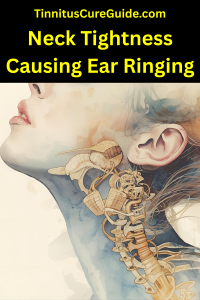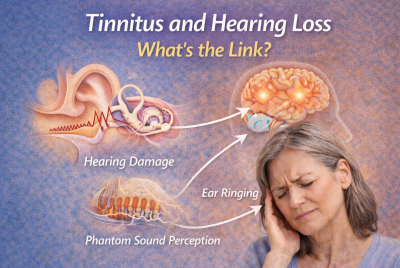Neck Tightness Causing Ear Ringing: Understanding the Connection
When Neck Tension Meets Ear Ringing
If you’ve ever noticed ringing in your ears after a long day at the desk, hunching over your phone, or dealing with stiff shoulders, you’re not alone. Many tinnitus sufferers report that neck tightness causing ear ringing, makes their symptoms worse. That high-pitched buzzing, whooshing, or constant ear ringing can feel overwhelming, especially when it’s triggered by something as common as muscle tension.
But what’s the real link between neck stiffness and tinnitus? Can tight muscles in your neck really affect your hearing? And most importantly, what can you do about it? Let’s break down the science, treatments, and practical prevention tips.
Can Neck Tightness Really Cause Ear Ringing?
Yes, it can. Tightness in the neck and shoulder muscles can influence the auditory system in several ways:
-
Nerve Irritation: Tense neck muscles can compress nerves connected to the ear, altering sound perception.
-
Blood Flow Restriction: Poor posture and stiff muscles reduce blood flow to the inner ear, leading to ringing in the ears.
-
Somatic Tinnitus: This type of tinnitus is triggered by body movement or muscle strain, especially in the neck and jaw.
In fact, studies show that people with cervical spine issues are more likely to report constant ear ringing or ear buzzing sounds.
Symptoms of Neck-Related Tinnitus
If your tinnitus is connected to neck tightness, you may notice:
-
Ringing or buzzing that worsens when you move your head or neck
-
Ear ringing at night after sitting in a poor posture all day
-
Pain or stiffness in the neck and shoulders, alongside ear noises
-
A sensation of pressure in the ears with a whooshing sound in ears
Common Causes of Neck Tightness Causing Ear Ringing
1. Poor Posture and Technology Use
Spending hours hunched over a computer or smartphone can lead to tech neck, a condition that strains cervical muscles and may trigger tinnitus.
2. Stress and Muscle Tension
The stress and tinnitus connection is well established. Stress tightens muscles, particularly in the neck and jaw, increasing sudden tinnitus flare-ups.
3. Cervical Spine Issues
Conditions like herniated discs, arthritis, or whiplash can irritate nerves and blood vessels, contributing to cervical tinnitus causes.
4. Jaw and TMJ Disorders
Tight jaw muscles often link with neck stiffness, creating a cycle that worsens high-pitched ear noise.
Treatment Options for Neck-Related Tinnitus
1. Physical Therapy
Targeted neck stretches and strengthening exercises help release muscle tension and improve posture. Many patients report a reduction in the ear buzzing sound after consistent therapy.
2. Chiropractic Care
Realigning the cervical spine can reduce nerve compression and ease chronic tinnitus related to posture.
3. Massage Therapy
Neck and shoulder massage improves blood circulation, reducing stiffness and ear ringing causes and cures.
4. Sound Therapy
Using white noise for tinnitus or tinnitus sound therapy apps can mask ringing while treating neck tension.
5. Stress Reduction
Meditation, yoga, and Pilates help release muscle tightness and break the stress-tinnitus cycle.
6. Supplements and Lifestyle Changes
Some people benefit from the best supplements for tinnitus, like magnesium and zinc, which support nerve health.
Natural Remedies for Neck Tightness Causing Ear Ringing
Finding relief from neck tightness causing ear ringing doesn’t always require medication. Many people benefit from simple, natural approaches that target both muscle tension and tinnitus triggers.
Heat Therapy
Applying a warm compress or heating pad to the neck for 15–20 minutes helps increase blood circulation, reduce stiffness, and relax overworked muscles. Heat therapy is especially useful in the evening, when tension builds up after a long day. Many tinnitus sufferers notice their ear buzzing sound eases once their neck muscles loosen.
Ergonomic Adjustments
Poor workstation setups are one of the biggest culprits behind ear ringing at night. If you spend long hours at a desk, invest in an ergonomic chair with proper lumbar and neck support. Keep your monitor at eye level to avoid craning forward. Small adjustments like these prevent posture-related cervical tinnitus causes from worsening.
Gentle Stretching
Daily stretching breaks up muscle tightness before it aggravates tinnitus. Try:
-
Neck rolls (slow circles to release stiffness)
-
Shoulder shrugs (lifting and relaxing shoulders to ease tension)
-
Chin tucks (bringing chin toward chest to correct posture)
These movements only take a few minutes but can significantly reduce constant ear ringing linked to cervical strain.
Hydration and Diet
Dehydration contributes to muscle cramping and poor circulation, both of which can worsen tinnitus. Aim for at least eight glasses of water daily. A diet rich in magnesium (leafy greens, nuts), omega-3 fatty acids (salmon, flaxseeds), and vitamin B12 supports nerve health. These nutrients are often recommended as part of natural tinnitus treatment.
Prevention Tips: Avoiding Neck-Related Ear Ringing
Tinnitus prevention often starts with small lifestyle changes that protect both your ears and your cervical spine.
Correct Your Posture
Keep your ears aligned with your shoulders while standing and sitting. Avoid slouching, craning your neck forward, or holding your phone between your ear and shoulder. Good posture keeps cervical nerves and muscles balanced, reducing ear ringing causes and cures linked to poor alignment.
Take Breaks
Sitting for long hours without movement tightens neck and back muscles, often triggering chronic tinnitus. For every 30 minutes at a desk, take a short break—stand, walk, or stretch to keep blood flowing and tension low.
Invest in Ergonomics
Use chairs with built-in neck support, footrests if needed, and adjustable monitors. At home, make sure your pillow keeps your neck aligned during sleep. These changes not only prevent ear ringing at night but also reduce long-term cervical strain.
Practice Relaxation
Stress and anxiety can trigger both neck stiffness and tinnitus flare-ups. Relaxation methods such as yoga, deep breathing, progressive muscle relaxation, and mindfulness meditation help reduce the stress and tinnitus connection. Even 10 minutes of daily practice can calm the body and ease symptoms.
Strengthen Muscles
Strength training for the neck, shoulders, and upper back builds long-term support and stability. Stronger muscles mean better posture and less strain on cervical nerves. Over time, this reduces the frequency of tinnitus after loud noise and posture-related ear ringing.
Real-Life Coping Strategies
Many U.S. patients combine lifestyle changes with medical support:
-
Using sound masking devices at night to block ringing.
-
See a physical therapist for tailored neck exercises.
-
Wearing hearing aids for tinnitus if hearing loss is present.
-
Joining support groups to manage the emotional side of tinnitus.
FAQs About Neck Tightness Causing Ear Ringing
1. Can neck tightness really trigger tinnitus?
Yes. Neck muscle strain and cervical misalignment can compress nerves or restrict blood flow, leading to ringing, buzzing, or whooshing sounds in the ears. This is often referred to as somatic or cervical-related tinnitus.
2. How can I relieve ear ringing caused by neck stiffness?
Gentle neck stretches, massage, heat therapy, stress management, and proper posture often help reduce tinnitus linked to muscle tension. If symptoms persist, consult a healthcare professional.
3. Does poor posture make tinnitus worse?
Yes. Forward head posture and slouching strain neck muscles and cervical nerves, which may worsen tinnitus symptoms. Correcting posture often provides noticeable relief.
4. Can physical therapy help with tinnitus from neck issues?
Absolutely. Physical therapy can strengthen neck muscles, improve alignment, and relieve tension that contributes to ear ringing. Many patients report symptom improvement after regular therapy.
5. Is tinnitus from neck tightness permanent?
Not always. For some, tinnitus improves with posture correction, stress reduction, and therapy. However, chronic cases may require ongoing management strategies.
6. What supplements support tinnitus relief?
Magnesium, zinc, and vitamin B12 may support nerve and circulatory health, helping some people reduce ear ringing intensity. Always consult your doctor before starting supplements.
7. Should I see a doctor for neck-related tinnitus?
Yes. If ear ringing is constant, worsening, or accompanied by dizziness or hearing loss, consult a doctor or audiologist to rule out other causes and get a treatment plan.
Conclusion: Taking Control of Neck Tightness and Ear Ringing
While tinnitus has many triggers, neck tightness causing ear ringing is a common and often overlooked factor. The good news? With the right combination of posture correction, stress relief, physical therapy, and sound therapy, many people find significant relief.
If you struggle with ear ringing linked to neck stiffness, start with small daily changes—stretching, improving your workspace, and practicing relaxation. And remember, professional guidance can make all the difference.
✅ Final Takeaway: Managing neck tightness is not just good for your spine—it may also help quiet the ringing in your ears and improve your quality of life.
Disclaimer
This article is for informational purposes only and should not be taken as medical advice. Ringing in the ears (tinnitus) can have many causes, and neck tightness is just one possible factor. Always consult a qualified healthcare professional or audiologist for diagnosis, treatment, and personalized care.







